Melatonin and Erectile Dysfunction: Link between and Effects on Sexual Health
Written by Dr. Pranitha Bangera

Dr. Pranitha Bangera is a gold-medalist healthcare professional with an elite foundation in clinical training and patient care. A researcher at heart, she specializes in creating high-impact, research-driven medical content that empowers readers through accessible patient education. Dr. Bangera focuses on the intersection of digital health and clinical communication, specifically within the fields of sexual health and mental well-being. Her work is dedicated to making complex medical innovations understandable and trustworthy for a global audience.
•
September 22, 2025
Our experts continually monitor the health and wellness space, and we update our articles when new information becomes available.
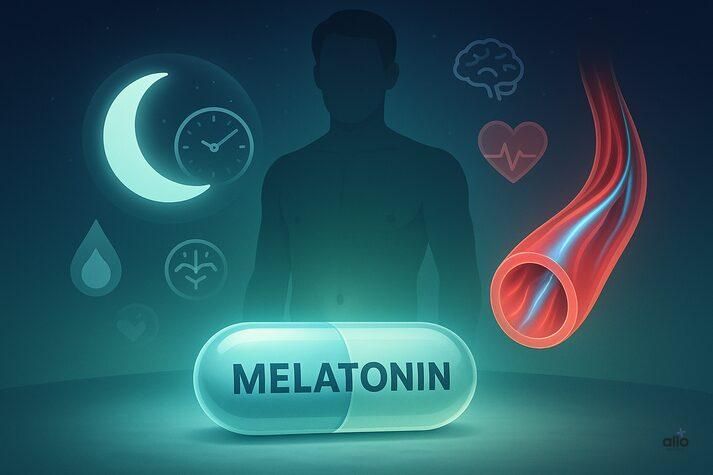
Quick Read
Melatonin does not cause erectile dysfunction. In fact, research suggests it may help by improving sleep, reducing oxidative stress, and supporting blood vessel and nerve health. Men with ED are often found to have lower melatonin levels and poorer sleep quality. While animal and early clinical studies show promise, melatonin should be viewed as a supportive aid, not a primary treatment. If you’re dealing with ED, proven medical therapies and lifestyle changes remain key, with melatonin serving as an optional extra layer of support.
Many men wonder about melatonin, the “sleep hormone,” when it comes to erections. Could it be a hidden cause of erectile dysfunction? Or does it actually offer some help? Research suggests that melatonin may help reduce the risk of erectile dysfunction (ED) by improving sleep quality, lowering cell damage, and supporting healthy blood flow. Studies also show that men with ED tend to have lower melatonin levels and poorer sleep quality compared to those without the condition. In this article, we’ll break down the connection between melatonin and ED, the potential benefits and side effects, and what men should know before considering melatonin as part of their sexual health routine.
Allo asks
Have you ever noticed a change in sexual health after using melatonin?
What is the link between Melatonin and ED?
Melatonin and erectile dysfunction (ED) are connected mainly through the way melatonin influences sleep, hormones, and blood vessel health. Melatonin is the hormone released by the pineal gland. Its main job is to regulate the sleep-wake cycle and promote healthy sleep quality. Many people also take melatonin supplements to manage sleep disorders such as insomnia or jet lag. Poor sleep doesn’t just make you feel tired but can directly affect your sexual health. Here’s how:
- Testosterone, the key hormone for sexual desire and firm erections, is produced mainly during deep sleep. When sleep is poor, testosterone levels drop
- Stress hormones like cortisol rise due to poor sleep, making intimacy more difficult.
- Lack of sleep also harms blood vessel health, reducing the circulation needed for erections.
- Fatigue, irritability, and low energy from bad sleep can lower interest in sexual activity and satisfaction during intercourse.
Over time, these changes can increase the risk of erectile dysfunction. And this is where melatonin may help.[1] We will explore this in detail later.
What Does Research Say?
Research suggests that men with ED often have lower serum melatonin levels and poorer sleep quality than men without ED. [2] That said, human clinical studies are still limited. While melatonin looks promising as a supportive factor, it should not be seen as a stand-alone treatment for erectile dysfunction. Evidence suggests melatonin may be most effective when combined with established ED treatments. The combination of melatonin with drugs used to treat ED (phosphodiesterase-5 inhibitors like tadalafil) has shown synergistic effects in both animal models and limited human studies. [3]
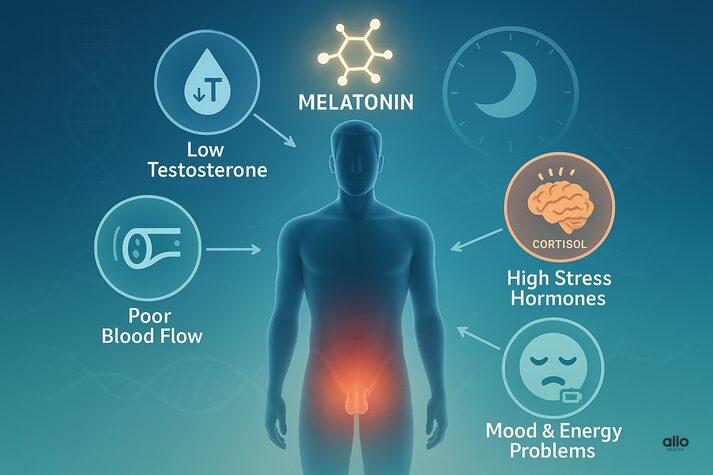
How Melatonin Affects Erectile Function
Melatonin may support erectile function in several ways. While much of the research is still early, scientists have identified a few key mechanisms that explain its potential benefits:
Antioxidant Properties:
- One of melatonin’s strongest effects is its ability to act as a powerful antioxidant.
- Oxidative stress, which is essentially “cell damage,” is caused by free radicals. Free radicals are unstable molecules in your body that are “incomplete,”. They go around stealing from healthy cells, which causes damage. This is a major contributor to erectile dysfunction because it harms healthy blood vessels.
- Melatonin helps by neutralizing free radicals, boosting the body’s own antioxidant enzymes, and improving energy production in cells (mitochondrial function). [4]
Nitric Oxide Pathway Enhancement:
- Erections depend on nitric oxide, a messenger that relaxes muscles in the penis and allows blood to flow in.
- Oxidative stress often lowers nitric oxide levels by breaking them down too quickly.
- Melatonin helps preserve nitric oxide by protecting it from damage. It has been shown in animal studies to increase the enzymes that make nitric oxide (endothelial and neuronal NO synthase), while lowering those that contribute to harmful inflammation. [5]
Protecting Nerves and Nerve Signals:
- Healthy nerves are just as important as healthy blood flow when it comes to erections.
- If the nerves that carry signals between the brain and the penis are damaged, which can happen in cases like diabetes or after pelvic surgery, erections can become weak or stop altogether.
- Melatonin has been shown to help protect these nerves from damage and may even support their healing. [6]
Sleep Quality:
- As mentioned earlier, restful sleep is important for healthy sexual function.
- By improving sleep quality, melatonin supports testosterone production, lowers stress levels, and helps protect blood vessels. Together, these effects may indirectly improve sexual health and reduce the chances of erectile problems.
Support in Chronic Illness:
- Erectile dysfunction is especially common in men with chronic health problems like diabetes mellitus and chronic kidney disease. These conditions often cause high levels of oxidative stress and damage to blood vessels and nerves, both of which are critical for healthy erections.
- Melatonin’s antioxidant effects may offer some protection in these cases. By reducing cell damage, calming inflammation, and improving blood vessel function, melatonin could help erectile function in men living with these long-term illnesses.
- While it’s not a cure, it may serve as an additional layer of support alongside standard medical treatments.
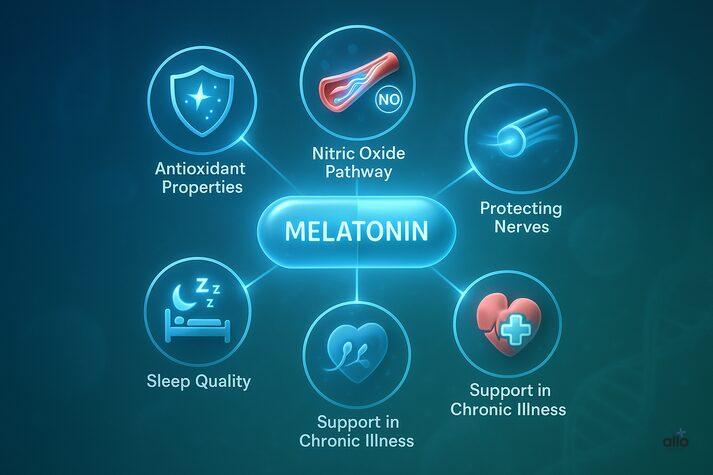
Does Melatonin Cause Erectile Dysfunction?
There’s no solid evidence that melatonin directly causes erectile dysfunction. However, like any supplement, melatonin does come with some possible downsides and side effects that are worth knowing about.
Possible Downsides
1. Hormonal Disruption at High Doses:
- Very high doses of melatonin could interfere with the body’s natural hormone balance.
- Research shows melatonin may interact with the hypothalamic–pituitary–gonadal (HPG) axis, the system that controls testosterone production and reproductive health. [7]
- Short-term use of melatonin appears safe for most people, but prolonged, high-dose supplementation could potentially affect testosterone levels in some individuals.
2. Daytime Drowsiness or Reduced Libido:
- A small number of people report feeling overly sleepy during the day or noticing lower sexual desire while using melatonin. These effects are uncommon and usually mild.
Potential Side Effects
- Drowsiness, headache, and dizziness.
- May interact with blood pressure medications and can affect blood sugar levels.
- It can influence other hormonal systems, particularly in long-term use.
Using melatonin does not cause ED. In fact, it may protect the body from some of the damage that leads to erection problems.
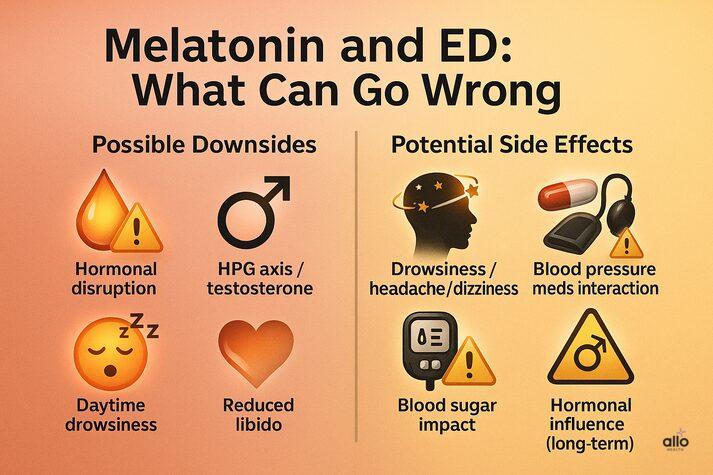
What To Keep In Mind About Melatonin
If you’re taking melatonin and are worried about ED, here’s some advice:
- There’s no strong evidence that melatonin causes ED.
- For patients with sleep disorders and erectile dysfunction, melatonin supplementation might offer dual benefits.
- Always consult a doctor if you notice persistent erectile issues. A proper diagnosis of erectile dysfunction is essential before starting therapy.
- Lifestyle factors like diet, exercise, and stress management often play a bigger role than melatonin alone.
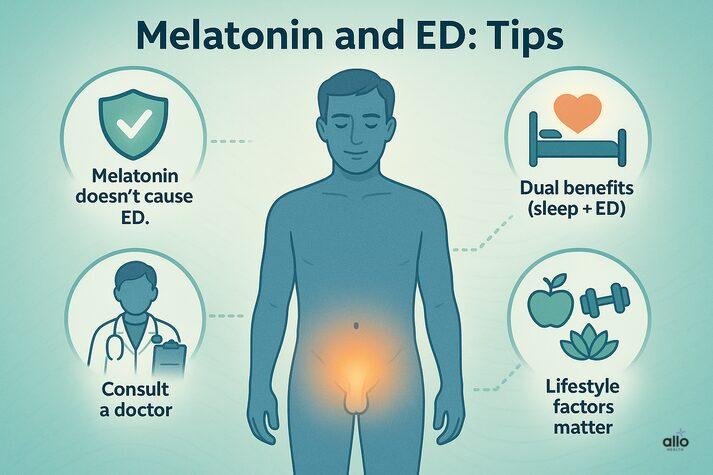
Conclusion
Melatonin, the sleep-regulating hormone, may indirectly help patients with erectile dysfunction by improving sleep quality, reducing oxidative stress, and supporting vascular health. That said, the current evidence is based mostly on animal studies and pre-clinical studies, with only a handful of clinical study data available. For now, melatonin should be seen as a supportive option, not a primary therapy for erectile dysfunction. Men struggling with ED should seek medical treatment and explore proven therapies for erectile dysfunction, while viewing melatonin as an additional tool for better overall health.
Disclaimer
The following blog article provides general information and insights on various topics. However, it is important to note that the information presented is not intended as professional advice in any specific field or area. The content of this blog is for general educational and informational purposes only. The content should not be interpreted as endorsement, recommendation, or guarantee of any product, service, or information mentioned. Readers are solely responsible for the decisions and actions they take based on the information provided in this blog. It is essential to exercise individual judgment, critical thinking, and personal responsibility when applying or implementing any information or suggestions discussed in the blog.
Most Asked Questions
Does melatonin cause erectile dysfunction?
No, there’s no solid evidence that melatonin causes ED. In fact, studies suggest men with ED often have lower melatonin levels. At very high doses, melatonin might affect hormone balance, but this is uncommon.
Can melatonin help improve erectile function?
Yes, indirectly. Melatonin may improve sleep quality, lower stress, protect blood vessels, and reduce cell damage, all of which support healthier erections.
Is melatonin safe to take if I have ED?
Short-term use is generally considered safe for most people. However, melatonin can cause drowsiness, interact with blood pressure or diabetes medications, and affect hormone levels if taken long-term in high doses. Always check with your doctor first.
Can melatonin be combined with ED medications like Viagra or Cialis?
Research suggests melatonin may enhance the effects of PDE-5 inhibitors (like tadalafil), but this hasn’t been widely studied in humans. Always ask your doctor before combining treatments.
What is the best time to take melatonin for ED?
Melatonin works best when taken in the evening, 30–60 minutes before bedtime, since its main role is to regulate the sleep cycle.
Sources
- 1.
Acute low doses of melatonin restore full sexual activity in impotent male rats
- 2.
Low serum melatonin levels are associated with erectile dysfunction
- 3.
Melatonin and tadalafil treatment improves erectile dysfunction after spinal cord injury in rats
- 4.
Melatonin prevents deterioration of erectile function in streptozotocin-induced diabetic rats
- 5.
Melatonin Improves Erectile Function in Rats With Chronic Lower Body Ischemia
- 6.
Neuroprotective effects of melatonin on erectile dysfunction in streptozotocin-induced diabetic rats
- 7.
Melatonin inhibits testosterone secretion by acting at hypothalamo-pituitary-gonadal axis in the rat


